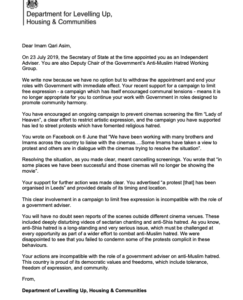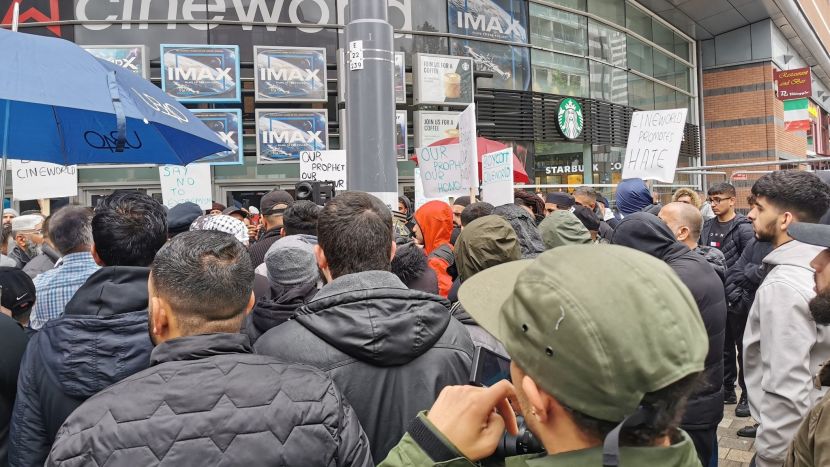“The Lady of Heaven” was released in the UK on the 3rd of June 2022 and has since been banned by the cinema chain Cineworld, after it prompted protests outside some of its movie theaters in Birmingham, Bolton and Sheffield1. The film has also been banned in Morocco, Pakistan, Egypt, Iraq, and Iran.
According to the spokesperson for Cineworld, the decision was made “to ensure the safety of our staff and customers”2. Both the film’s release, and its subsequent banning, have been met with much division amongst Muslim communities, Councils, and British MP’s. For example, the Chairman of the Bolton Council of Mosques Asif Patel, has called the film “blasphemous”, arguing that Lady of Heaven is “underpinned with a sectarian ideology [which] misrepresents orthodox historical narratives and disrespects the most esteemed individuals of Islamic history”3. By contrast, a member of the House of Lords described the decision to ban it as “disastrous for the arts [and] dangerous for free speech”4.
The Muslim Council of Britain has described the film as “divisive”4 and declared that whilst they “support those scholars and leaders who are advocating for greater unity and for the common good” they recognise there are some “including many of this film’s supporters or those engaging in sectarianism in their response – whose primary goal is to fuel hatred”5.
Background to the Film and its Controversies
The Lady of Heaven is the first film to ever depict the story of Lady Fatima, the daughter of the Prophet Mohammad. The first issue is that both Ali bin Abui Talib (Fatima’s husband and cousin to the Prophet) and the Prophet Mohammad appear in the movie, which is in violation of the “Islamic convention”, which forbids actors portraying religiously revered characters8. For this reason, a disclaimer is made at the beginning of the film stating that on-screen portrayal of both figures is achieved using special effects; a unique synthesis of actors, in-camera effects, lighting and visual effects6, and no single actor is credited with playing the Prophet7.
The film is written by Shia Muslim cleric Sheikh Yasser al-Habib (a Kuwaiti Twelver Shia scholar and head of the now-dissolved “The Mahdi Servants Union”). Yasser had previously been imprisoned in Kuwait and striped of his nationality, where the Kuwait National Assembly also demanded the suspension of the activities of The Mahdi Servants Organisation, because iit was accused of promoting “Rafida global voice and movement and a revival of the Rafida Shi’a faith”8.In 2005 Yasser al-Habib migrated to the UK and re-established The Mahdi Servants Organisation in London.
The plot follows two stories of Fatima and a young Iraqi boy, separated by 1400 years. Both stories meet in modern-day Iraq when the Islamic State (ISIS) seizes vast areas of territory and the young Iraqi boy’s mother is killed. The film has been criticised for representing a Shia interpretation of Islamic history, deemed blasphemous and sectarian by the Muslim Action Forum (the assembly of major Muslim organisations in the UK) for demonising revered figures of Sunni Islam, such as Abu Barkr. Al-Habib has previously argued that modern terrorism stems from Abu-Bakr and the Prophet’s wife: Aisha, 9. The Muslim Action Forum argues that the depictions are “designed to cause outrage and hatred between communities, especially between Shias and Sunnis”10.
The foundational difference between Sunni and Shia occurred with the succession dispute following the death of the Prophet Mohammed in 632AD, where Shi’a Muslims believe Ali bin Abi Talib (Fatima’s husband) was appointed directly by the Prophet as caliph, whereas Sunni Muslims believe Abu Bakr (Prophet Mohammed’s comparison) was the legitimately elected successor of the Prophet as Community leader11.
The circumstances of Fatima’s death are another contentious issue. Shi’a scholars, such as Yasser al-Habib believe that shortly after the Prophet’s death, two of his companions, Abu Bakr and Umar, injured Fatima behind a door whilst forcing entry into Ali bin Abi Talib’s home12. These injuries eventually led to her death. Shia Muslims who hold this belief are referred to as “Rafida”. Conversely, many Sunnis find the suggestion that two of their most revered figures caused the death of the Prophet’s daughter to be offensive. Regarding the movie, “Lady of Heaven”, most critics agree that the opening scene contains a veiled reference to this specific interpretation of Fatima’s death. In the film, the Islamic State fighters force entry into the young boy’s home and execute his mother (called Fatima) behind the door . The film’s website also describes Fatima as “the first victim of terrorism”13.
More than 117,000 people have signed a petition to get the film removed from all UK cinemas14. Whilst Cineworld has stopped showing it, VUE cinemas has continued and issued the following statement: “Vue takes seriously the responsibilities that come with providing a platform for a wide variety of content and believes in showcasing films of interest to diverse communities across the U.K”15.
Responses to banning
The executive producer of the film, Malik Shlibak has announced that he has received death threats on twitter and been called an infidel16, but he considers the controversy surrounding the movie as “brilliant” because it has brought in “huge audiences”17. In a statement to the UK Guardian, Shlibak stated that cinemas should “stand up and defend their right to show films that people want to see”. He also added:
“I think cinemas are crumbling to the pressure, and taking these decisions to quell the noise […] this is an artistic endeavour talking about and elaborating on history and religion, which always has a plethora of different takes and interpretations. That’s normal and healthy. We welcome this and we welcome people to express themselves, whether they’re for or against the film”18.
The imam of Leeds Makkah Mosque, Qari Asim, was removed from his position of deputy chair of the UK government’s Anti-Muslim Hatred working group, after backing calls for Lady of Heaven to be banned from UK cinemas, although he did not attend or organised protests himself. Asim was told his appointment had to end, in a letter from the Department of Levelling Up, Housing and Communities19.A full copy of the letter can be seen in the image below.

In response to this decision, Asim said he remains “fully supportive of open public dialogue and scholarly debate around historical narratives between Sunni and Shia perspective that does not fuel hatred or division in communities”20. He further added that he “did unequivocally condemn anti-Shia hatred” that was heard at Leeds protests to his own congregation and he has had “no opportunity to clarify any misunderstandings”21 to the UK Government.
Sources
Cineworld cancels The Lady of Heaven film screenings after protests – BBC News
UK cinema chain cancels screenings of ‘blasphemous’ film after protests | Film | The Guardian
The Lady of Heaven (2021) – IMDb
Cancelling “The Lady of Heaven”: Why the fuss over the Prophet’s daughter? – Qantara.de
Why the Lady of Heaven film is dividing Muslim opinion (theconversation.com)






